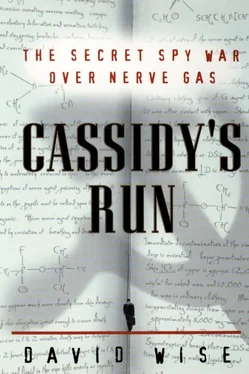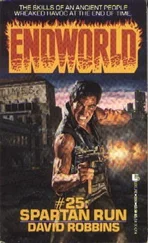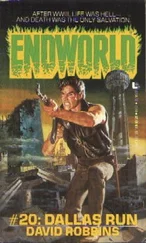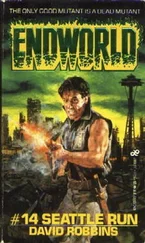The government never formally acknowledged to her that Mark Kirkland died while working on an espionage case for the FBI. In April 1991, however, the bureau held a ceremony at its new Minneapolis field office at which both Kirkland and Tren Basford were given official recognition for their service. Julie and her children were there, along with Tish Basford and her son and granddaughter.
At the ceremony, a wall was unveiled in which the names of the two agents, and other FBI agents who had died in the line of duty, are inscribed. On behalf of Mark, Julie Kirkland received the FBI’s purple cross, which the bureau gives to the families of fallen agents, and a citation. The citation did not say anything about national security or espionage, but she was told the truth informally. That day, Julie Kirkland said, “was the first I got the name of the case-PALMETTO. Dennis Conway told me.”
The purple cross rests in a walnut box. The medal is a five-pointed gold cross that surrounds a medallion with a purple star at its center. It hangs below a white ribbon with a purple center stripe. Officially, the medal is known as the FBI Memorial Star.
A brass plate on the box bears these engraved words: “In memory of Mark A. Kirkland, Special Agent, Federal Bureau of Investigation, United States Department of Justice. In honor of Special Agent Kirkland who lost his life in a plane crash in Dewey Lake, Minnesota, on August 25, 1977, while conducting an aerial surveillance for the FBI in connection with a highly sensitive matter. Mr. Kirkland’s performance in this case was in the highest traditions of the Bureau and this special acknowledgment is presented in his memory. William S. Sessions, Director, April 26, 1991.”
Julie Kirkland treasures the purple cross. She keeps it in a place of honor, on a shelf in the dining room of her home.
“I think I’ll give it to my son Kenny,” she said. “It means a lot to him. He was only three, but he remembers his father.”
It was in 1991, a few months before the collapse of the Soviet Union, that I first heard fragmentary reports of an extraordinary espionage case that had lasted for more than two decades during the height of the cold war.
In the course of the operation, I was told, two FBI agents had been killed while engaged in aerial surveillance. Secret nerve-gas formulas had been passed to the Soviets as part of a massive but potentially dangerous deception operation. A Mexican couple was involved, but the Justice Department had allowed them to escape at the last moment.
Not one word of the dramatic case had ever been made public. It remained locked in the government’s classified files. Researching the story would be, to say the least, a challenge.
I began to try. At the heart of the operation, I learned, was an American double agent. I found out that he was a noncommissioned army officer, but for five years, for perhaps understandable reasons, no one would tell me his name or where he was.
I did discover the identity of Mikhail Danilin, his principal Soviet control, however. With the support and encouragement of Mike Sullivan, the executive producer of television’s Frontline, I went to Moscow in 1993 to try to find and interview him and to see if I could learn more about the case from Russian officials or files. Where to begin? There are no telephone books in Moscow, but through my contacts I was fortunate enough to find someone who knew Danilin and got in touch with him at my request. Word came back that Danilin was close to retirement but still worked for the GRU and could not speak with me. Still playing his role as a spy, Danilin claimed through my intermediary that “he had nothing to do with the case. It belonged to someone else.”
I knew better, but the Danilin route was blocked. The Soviet Ministry of Defense refused to answer any questions about the case. Soon after I left Moscow, Danilin died. I later spoke with his widow, Margarita, but she declined to provide any information about him or his career.
The Pentagon was no more forthcoming than the Soviets. My requests for files under the Freedom of Information Act brought the misleading reply that the army had “no record” of the case. In 1996, I approached Kenneth H. Bacon, the assistant secretary of defense for public affairs, who was responsive and asked the then secretary of the army, Togo D. West, Jr., to review the matter. Secretary West agreed. After many months I was told that yes, the files existed after all, but, no, nothing would be released, for reasons of national security.
Around the same time, however, I learned the identity of the American double agent and gained his cooperation and that of his wife, who had shared his secret life. It was a major breakthrough in my knowledge of what the Joint Chiefs of Staff had called Operation SHOCKER. Over time, I was able to interview many former FBI agents, who gradually began to provide details of the case and its two offshoots, PALMETTO and IXORA. A number of Pentagon sources cautiously talked to me as well. The more I learned, the more I realized that SHOCKER was emblematic of how the cold war had been fought in secret by the intelligence agencies of the two superpowers.
All the while, I appealed to the FBI to open its case files and assist me in telling the story. Although some of the bureau’s senior counterintelligence officials felt that with the end of the cold war the story could now be told, they were unwilling to help unless the army also agreed to make information available, and it refused. There the matter remained until finally, late in 1997, John F. Lewis, Jr., FBI assistant director in charge of the national-security division, broke the logjam. Beginning in the summer of 1998, Lewis and James T. “Tim” Caruso, head of the FBI section concerned with Russian intelligence, provided limited but valuable assistance that helped greatly in my understanding of the history of the PALMETTO and IXORA cases. They also made it possible for me to interview several current and former agents who might not otherwise have talked with me.
To research this book, I conducted some 450 interviews with almost 200 persons. I am indebted first and foremost to Joe and Marie Cassidy, who spoke to me at length and answered all of my questions with abiding patience and good humor. I shall always value their friendship and generous assistance.
Julie Kirkland, the widow of Special Agent Mark A. Kirkland, was enormously helpful and also earned my enduring gratitude. I am greatly indebted as well to Letitia Basford, whose husband, Special Agent Trenwith S. Basford, perished in the same plane crash.
Many present and former FBI agents helped me to tell this story, even though they understood that the operation, like any human endeavor, was not without risk, flaws, and problems, along with its considerable successes. Among the retired agents to whom I am especially indebted are Phillip A. Parker, John J. O’Flaherty, Eugene C. Peterson, and Charles Bevels. Many others helped, including James E. Nolan, Jr., James F. Morrissey, Robert J. Schamay, Charles T. Weis, James E. Lancaster, Edgar Dade, Douglas MacDougall, Donald F. Lord, Richard McCarthy, Robert C. Loughney, John W. McKinnon, William O. Cregar, Carmen Espinoza, and Courtland J. Jones. Others preferred not to be identified, but I am equally appreciative of their help.
I am grateful as well to several officials and agents who were still working for the FBI as I researched the book. In addition to John Lewis and Tim Caruso, I am indebted to Bill Carter of the FBI’s national press office; A. Jackson Lowe and Dan LeSaffre, who provided many details of the fascinating IXORA case; as well as Aurelio Flores, Leslie G. Wiser, Jr., Sheila Horan, Dennis Conway, Ronald J. Van Vranken, and William M. Clifford. Before he retired in 1994, R. Patrick Watson, then deputy director of the FBI’s intelligence division, also helped.
Читать дальше












